The Joan Palevsky  Imprint in Classical Literature
Imprint in Classical Literature
In honor of beloved Virgil
O degli altri poeti onore e lume...
Dante, Inferno
Failure of Empire
Valens and the Roman State
in the Fourth Century A.D.
Noel Lenski
UNIVERSITY OF CALIFORNIA PRESS
Berkeley Los Angeles London
The publisher gratefully acknowledges the generouscontribution to this book provided by Joan Palevsky.
University of California Press
Berkeley and Los Angeles, California
University of California Press, Ltd.
London, England
2002 by The Regents of the University of California
Library of Congress Cataloging-in-Publication Data
Lenski, Noel Emmanuel, 1965
Failure of empire : Valens and the Roman state in the fourthcentury A.D. / Noel Lenski.
p. cm.
Includes bibliographical references and index.
ISBN 978-0-520-23332-4 (alk. paper)
eISBN 978-0-520-92853-4
1. Valens, Emperor of the East, ca. 328-378. 2. ByzantineEmpireHistoryValens, 364378. 3. Valentinian I, Emperorof Rome, 321375. 4. RomeHistoryValentinian I,364375. I. Title.
DF559.L46 2002
949.5'9013dc21 |
2002009716 |
Ausoniae
amoribus meis
CONTENTS
ILLUSTRATIONS
ACKNOWLEDGMENTS
By some turn of fate, I was inspired to work on Valens while watchingDonizettis Lelisir damore at the Metropolitan Opera. Valens would not haveapproved. After all, he and his brother killed people for dabbling in lovephilters. Of course, I am well aware that Valens is not a person to whom manywould choose to be wedded for eight years. Indeed, I did not begin my studybelieving that our relationship would last so long, nor did I pursue it becausemy feelings for the man grew as I worked. Even so, I hardly regret my choiceto investigate his life and times in such lavish detail. I have always found misfitsfascinating, and I find Valenss peculiarities and peccadilloes particularlyattractive for their complexity and pathos. His humanity has not been entirelyobscured by the thick shroud of rhetoric that envelops so many late Romanrulers. Though the shroud is certainly present, Valenss failures have left alarge rent in its fabric, giving us a fairly clear picture of the man underneath.For this reason, Valens makes an excellent case study in how an ordinaryman confronted an extraordinary challengethe challenge of empireandultimately failed to meet it.
This book grew out of a Princeton dissertation, which I completed in 1995.That work, which included the material found here in chapters 1 through 4and chapter 7, was substantially rewritten. To it were added chapters 5 and 6and the appendices. As this book owes much to its previous incarnation, Iowe much to my dissertation advisors, Peter Brown, Ted Champlin, and BobLamberton. Each has fostered my work and my career with incomparablegenerosity and intellect. The numismatic work in the book was done onfellowship at the American Numismatic Society under the direction of BillMetcalf, whose graciousness and acumen merit the highest praise. Much of thedissertation was written while I held a Donald and Mary Hyde FoundationFellowship at Oxford in 199394. There Peter Heather, Roger Tomlin, andCharlotte Rouech were especially generous in sharing their time andknowledge. Above all, however, John Matthews offered unstinting supportand advice. I owe a heavy debt not just to his encouragement but also to hisscholarship, which has, more than anyones, influenced my own work.
As I began to revise, Craige Champion read and commented on theentire dissertation with admirable care. Individual chapters and sections wereread by Jacques Bailly, Tim Barnes, Glen Bowersock, Garth Fowden, MikeGaddis, Cathy King, John Ma, and Brent Shaw. My learned wife AlisonOrlebeke patiently read at least one draft of everything I wrote and proved tobe my best critic of style and logic. Eventually, Hal Drake and Peter Heatherread the manuscript I sent to Berkeley and helped me clear away severalhurdles I had left standing. I am particularly grateful to Heather, who has beeninvolved in this project since 1993 and who has treated me and my work withthe utmost respect, despite our differences on matters Gothic.
The University of Colorado granted me a teaching release in the springof 1998, and Dumbarton Oaks awarded me a fellowship for that summer,part of which I used for this book. CU also funded two undergraduateresearch assistants, Joanna Koutsis, who helped me assemble Theodosian Codelaws, and Leanne Smoot, who prepared the maps. Jim Robb of CUcartography did final revisions on those maps, Dave Underwood in CU graphicsdid much of the work for my images, and the CU interlibrary loan staff havebeen amazingly efficient in helping me find resources. As editor, Kate Tollhas combined equal measures of patience and pressure into a remarkablyeffective elixir, which has finally helped me break the spell of Valens.
More than anyone, however, I must thank my family: my parents andbrothers, who have always supported my endeavors with encouragement; mychildren Paul and Helen, who have had to share daddy with a long-deademperor since they were born; and above all my true love Alison, whose charmsoffer the only real antidote for my labors.
ABBREVIATIONS
Abbreviations for ancient sources follow the conventions of eitherThe Prosopography of the Later Roman Empire, vol. 1:A.D 260395, ed. A. H. M. Jones, J. R.Martindale, and J. Morris (Cambridge, 1971), or The Oxford ClassicalDictionary3, ed. S. Hornblower and A. Spawforth (New York, 1996). Abbreviationsfor periodical titles follow LAnne philologique. Note also the following:
| AM | Ammianus Marcellinus, Rerum gestarum libri quisupersunt, ed. C. U. Clark (Berlin, 1910) |
| ASX | The Geography of Ananias of Sirak (Asxarhacoyc), trans.R. H. Hewsen (Wiesbaden, 1992) |
| BP | Buzandaran Patmutiwnk, Epic Histories attributed toPawstos Buzand, trans. N. Garsoan (Cambridge, Mass.,1989) |
| Chron. Edes. | Chronicon Edessenum, ed. I. Guidi (Paris, 1903) |
| CSCO | Corpus scriptorum Christianorum orientalium (Paris,1903) |
| DRB | De rebus bellicis, ed. R. I. Ireland (Leipzig, 1984) |
| Ephrem | Ephrem Syrus (CJ = Contra Iulianum; CN = CarminaNisibena) |
| Epit. | Epitome de Caesaribus, ed. F. Pichlmayr (Leipzig, 1966) |
| Exc. Val. | Excerpta Valesiana, ed. J. Moreau (Leipzig, 1968) |
| Exp. tot. mun. | Expositio totius mundi et gentium, ed. J. Roug (Paris,1966) |
| Fest. Ind. | Festal Index, eds. A. Martin and M. Albert (Paris, 1985) |
| Gnecchi | I medaglioni romani, ed. R. Gnecchi (Milan, 1912) |
| GNO | Gregorii Nyseni opera, ed. W. Jaeger et al. (Leiden,1952) |
| Itin. Eg. | Itinerarium Egeriae, eds. A. Franceschini and R. Weber(Turnhout, Belgium, 1965) |
| Josh. Styl. | The Chronicle of Pseudo-Joshua the Stylite, trans. andcomm. F. R. Trombley and J. W. Watt (Liverpool, 2000) |
| MX | Moses Khorenatsi History of the Armenians, trans. R. W.Thomson (Cambridge, Mass., 1978) |
| Nagl Val. | A. Nagl Valens 3 RE II.7.2 (Stuttgart, 1948) |
| Nagl Vt. | A. Nagl Valentinianus 1 |

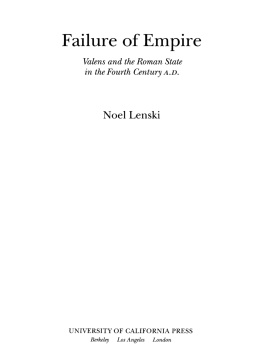

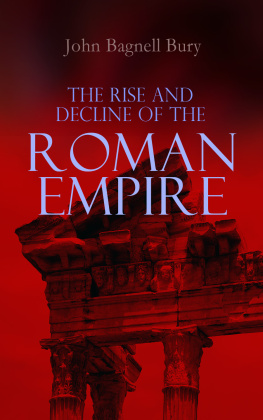
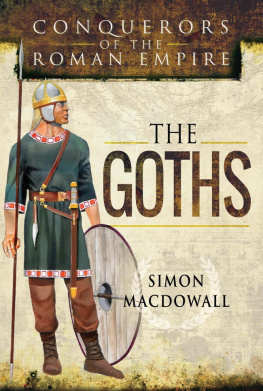
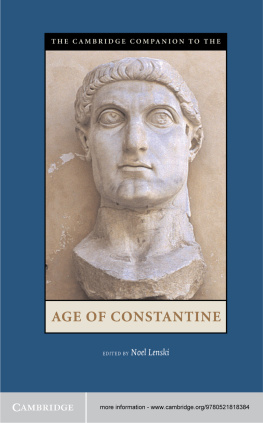

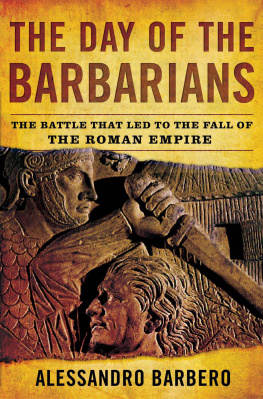
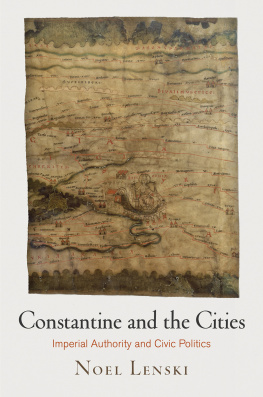
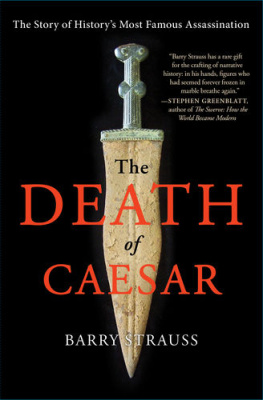

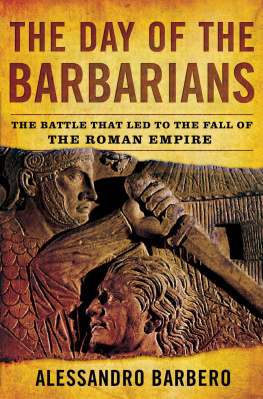
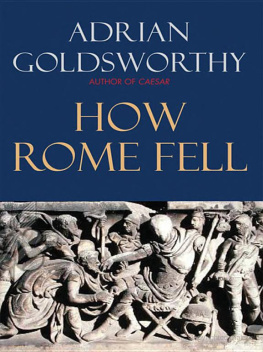

 Imprint in Classical Literature
Imprint in Classical Literature